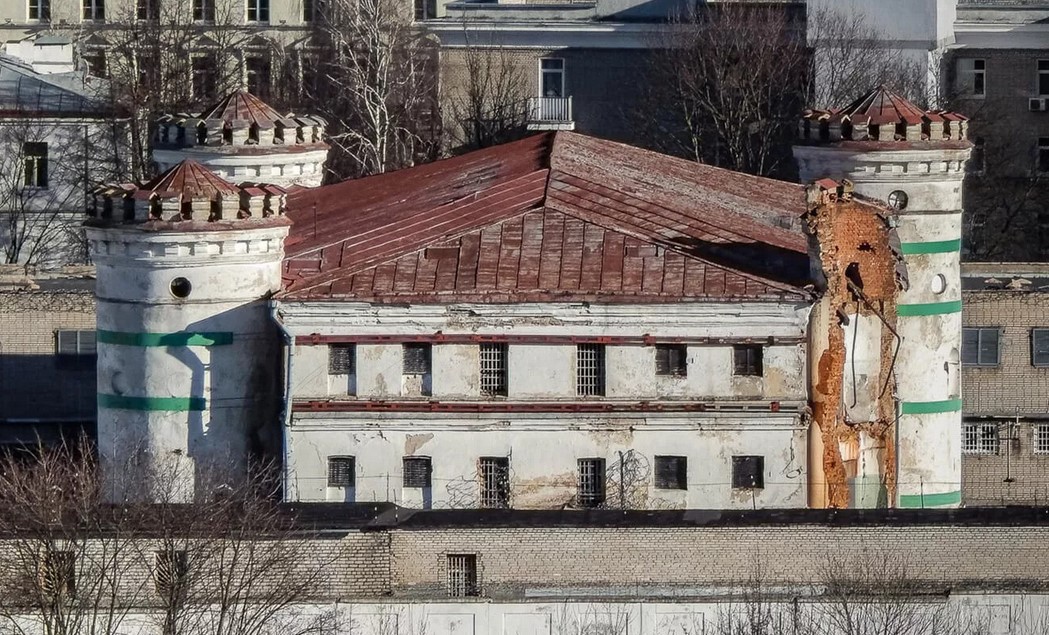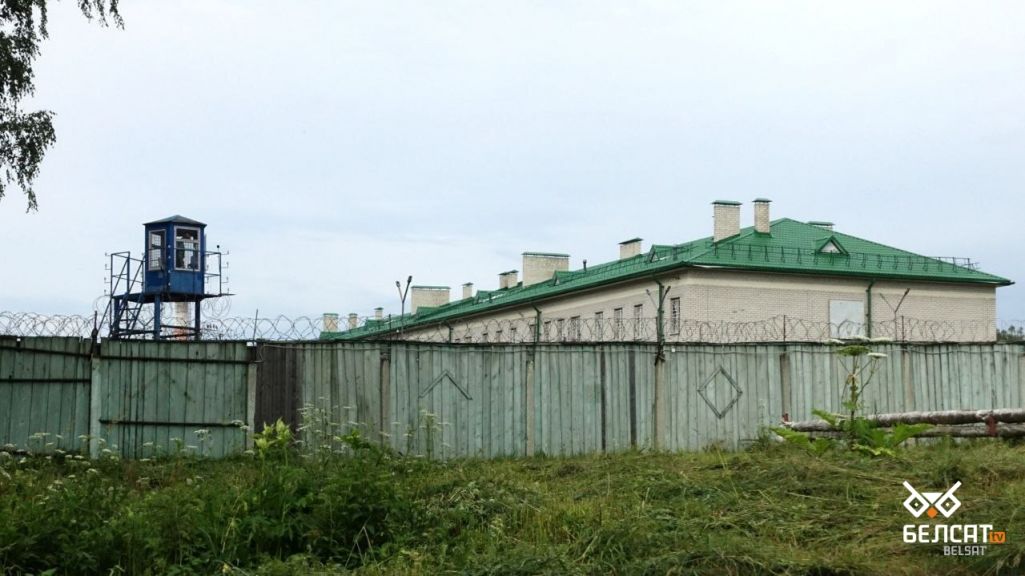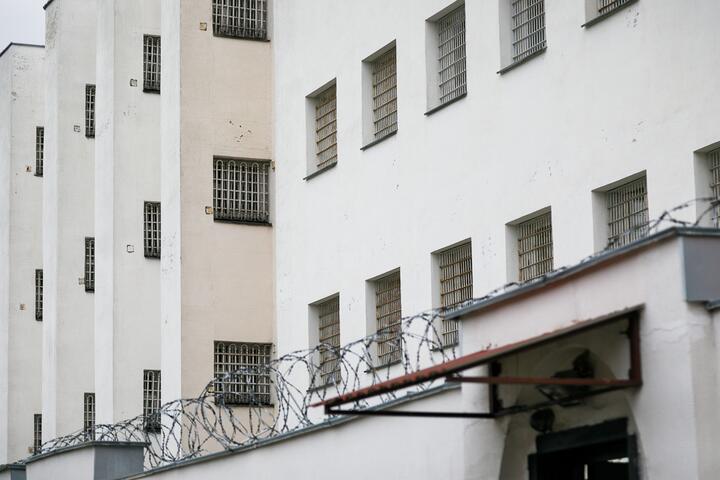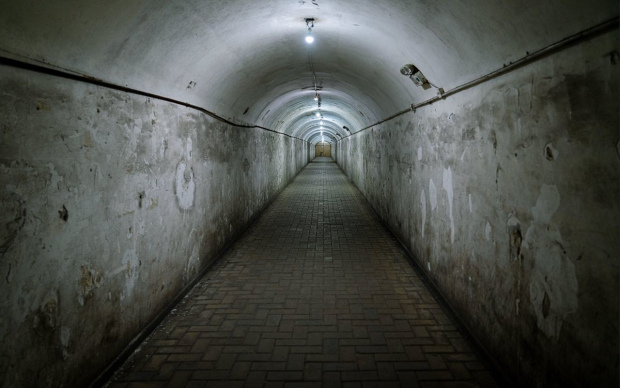On torture with light: how LED lamps destroy eyesight, making prisoners unable to distinguish between day and night. On the catastrophic deterioration of dental health — with many inmates suffering from pain, crumbling teeth, and tooth loss due to aluminum tableware, lack of sunlight, and poor nutrition. And the story of a political prisoner who tore his own gum open to let others sleep in peace.
Former political prisoners shared the health issues they faced during and after their time in detention.
Eyesight deterioration is a major issue for prisoners in Belarusian penitentiary facilities.
“My vision was minus 2, now it's minus 4 — here are my latest glasses,” says former political prisoner Olga (name changed upon her request). Olga spent several months in the detention centers at Akrestina and Volodarsky Street.

Detention Center On Volodarsky Street
“I could tell my eyesight was getting worse. In Akrestina (detention center), it’s dimly lit. There’s only one bulb, and it flickers constantly. The problem isn’t that we’re reading; it’s that the light never turns off. In Akrestina, they never turn it off, so you’re constantly under light.
In Volodarka, there’s also flickering duty light, and it’s just horrible. Then I was moved to another cell where we could turn the light off with a button. But whenever we did turn it off, my eyes would start flickering as if I were seeing cartoons.
Light from outside streams in through the ‘bars’ (a window covered with metal grills), but it doesn’t illuminate the cell. The fluorescent lamps stay on continuously, constantly flickering. This ruins your eyesight."
"My Eyesight Worsened Sharply in Detention. I started noticing it a couple of months in and asked for glasses,” adds former political prisoner Vladimir (name changed), who was held in the detention centers in Brest, Baranovichi, and Grodno, as well as in the Vitebsk correctional colony.
"When I was first detained, I didn’t need glasses. Now, I can’t do without them. I can still see distances well, but I can’t read without glasses anymore. I even have to enlarge the font on my phone.
In detention, the lighting is strange. The LED lights just sear your eyes. There’s no way to sit in darkness to let your eyes rest, as the light is always on. It’s also hard to read: there’s a bulb in the center of the cell, and you can’t sit directly under it, which means the book is always in shadow. The light is harsh, creating strong shadows.

Cells on Volodarka (screenshot from politzek.me)
At night, they turn on 'night lighting,' but it’s just as bright, only a different lamp. During the day, it’s on the ceiling; at night, it’s in the wall. But it’s still bright, never dark. People can only fall asleep out of sheer exhaustion. In the Baranovichi and Grodno detention centers, we couldn’t tell day from night. The metal shutters on the windows are so thick."
The deterioration of dental health, often severe, is another widespread problem. Many inmates develop serious dental issues. Former political prisoner Alexander Babko, who spent more than 8 months in detention, began experiencing severe tooth pain after being transferred to the Zhodino prison.
“I asked for a doctor, but he didn’t come, and my face started swelling. The pain was so bad it shot into my ears and brain. It throbbed so badly I couldn’t sleep. I had to tear my gum open and pull the tooth out with my fingers so the guys could sleep peacefully.”
In Zhodino prison, just before New Year’s, Alexander’s other cheek began swelling. The doctor again ignored his requests for help.
“I couldn’t sleep at all, and I was standing like a zombie, barely able to stand up during checks,” recalls Alexander Babko. Eventually, he did get to see a doctor, but right after root canal work, he was discharged with instructions to rinse his mouth with hydrogen peroxide.
In such conditions, prisoners come up with their own treatments. “We treated our own teeth. In the ‘prom zone’ (prison industrial zone), we’d gather oak bark and buds from spruce trees, all on the sly because getting caught meant punishment. We’d brew the bark with spruce needles and rinse our mouths with it. It helps when gums are inflamed. I saw this work, not only for me but for others too,” says Vladimir.
Former inmates report inadequate, and often cruel, treatment by prison medical staff.
“The dentist in Vitebsk didn’t seem like she’d graduated from a medical school but some Gestapo training,” Vladimir says. “She didn’t treat people but crippled their teeth. You go to her and say, ‘My tooth hurts,’ and she’s like, ‘Oh, it’s Monday. Come on Thursday afternoon.’ If you survive until Thursday, you go back, and she says, ‘I took patients in the morning, why are you here now? Come on Monday.’ That’s how she works. If she does anything, the fillings only last from her office to the barracks — at best until the next meal.

"Vitba" Correctional Colony (photo by "Belsat")
In autumn 2023, during a general check-up, it was found that about ten people had contracted hepatitis. Their previous tests were fine, so they started investigating. It turned out they all contracted it from the dentist. And nothing was done. She keeps working proudly, tormenting people and ruining their teeth.
The medical staff are like the rest of the guards. I don’t know what criteria they’re selected by. It’s a punitive system. Their goal is to break people — physically and morally. They keep you healthy just enough so you can keep working,” Vladimir says. He adds that during his time in Vitebsk, several inmates died simply due to a lack of proper medical care. The prison administration covered it up as best as they could.
Alexander explains that dental issues are caused by the conditions of confinement: “Everyone’s teeth started to hurt, fall out, or crumble. I think it’s from the aluminum utensils and the lack of sunlight.”
Vladimir insists that dental issues stem from the diet. “The balance of carbohydrates and minerals is off. There’s a severe lack of vitamins.”
He adds that by law, there is a package of products, including vitamins, that can be passed to inmates, but getting them is incredibly difficult. You must submit a request to the medical unit, which the head doctor has to approve. Family can only bring in these approved vitamins.
Olga also recounts her experience with prison food.
“At Akrestina, care packages were banned, and the food was... specific. Life hadn’t prepared me for that. I couldn’t eat it. The bread was awful. I dried it out and ate crackers, drinking tap water for 10 days.
When I was transferred to another prison, packages were allowed, but I didn’t feel hunger. I started monitoring what I needed to eat, and the women in the cell would remind me to have breakfast. I ate in the morning and once more during the day, forcing myself to eat.

Akrestina Detention Center (photo by Zerkalo)
I lost a lot of weight — 12 kilos. I was already tall and thin, but when I escaped the country, I was 51 kg at 1.76 meters. I understood what was happening and worked on it a lot. But it was very hard because nothing tasted good, and I had to force myself to eat. Now, I can eat, but with any stress, I lose my appetite completely.”
In Poland, where she now resides, doctors have found she has a low platelet count. Olga continues to struggle with disordered eating.
Former political prisoners shared the health issues they faced during and after their time in detention.
"My Vision Went from Minus 2 to Minus 4" Due to Dim Light and Flickering
Eyesight deterioration is a major issue for prisoners in Belarusian penitentiary facilities.
“My vision was minus 2, now it's minus 4 — here are my latest glasses,” says former political prisoner Olga (name changed upon her request). Olga spent several months in the detention centers at Akrestina and Volodarsky Street.

Detention Center On Volodarsky Street
“I could tell my eyesight was getting worse. In Akrestina (detention center), it’s dimly lit. There’s only one bulb, and it flickers constantly. The problem isn’t that we’re reading; it’s that the light never turns off. In Akrestina, they never turn it off, so you’re constantly under light.
In Volodarka, there’s also flickering duty light, and it’s just horrible. Then I was moved to another cell where we could turn the light off with a button. But whenever we did turn it off, my eyes would start flickering as if I were seeing cartoons.
Light from outside streams in through the ‘bars’ (a window covered with metal grills), but it doesn’t illuminate the cell. The fluorescent lamps stay on continuously, constantly flickering. This ruins your eyesight."
"My Eyesight Worsened Sharply in Detention. I started noticing it a couple of months in and asked for glasses,” adds former political prisoner Vladimir (name changed), who was held in the detention centers in Brest, Baranovichi, and Grodno, as well as in the Vitebsk correctional colony.
"When I was first detained, I didn’t need glasses. Now, I can’t do without them. I can still see distances well, but I can’t read without glasses anymore. I even have to enlarge the font on my phone.
In detention, the lighting is strange. The LED lights just sear your eyes. There’s no way to sit in darkness to let your eyes rest, as the light is always on. It’s also hard to read: there’s a bulb in the center of the cell, and you can’t sit directly under it, which means the book is always in shadow. The light is harsh, creating strong shadows.

Cells on Volodarka (screenshot from politzek.me)
At night, they turn on 'night lighting,' but it’s just as bright, only a different lamp. During the day, it’s on the ceiling; at night, it’s in the wall. But it’s still bright, never dark. People can only fall asleep out of sheer exhaustion. In the Baranovichi and Grodno detention centers, we couldn’t tell day from night. The metal shutters on the windows are so thick."
“I Had to Tear Open My Gum and Pull Out My Tooth by Hand”
The deterioration of dental health, often severe, is another widespread problem. Many inmates develop serious dental issues. Former political prisoner Alexander Babko, who spent more than 8 months in detention, began experiencing severe tooth pain after being transferred to the Zhodino prison.
“I asked for a doctor, but he didn’t come, and my face started swelling. The pain was so bad it shot into my ears and brain. It throbbed so badly I couldn’t sleep. I had to tear my gum open and pull the tooth out with my fingers so the guys could sleep peacefully.”
In Zhodino prison, just before New Year’s, Alexander’s other cheek began swelling. The doctor again ignored his requests for help.
“I couldn’t sleep at all, and I was standing like a zombie, barely able to stand up during checks,” recalls Alexander Babko. Eventually, he did get to see a doctor, but right after root canal work, he was discharged with instructions to rinse his mouth with hydrogen peroxide.
In such conditions, prisoners come up with their own treatments. “We treated our own teeth. In the ‘prom zone’ (prison industrial zone), we’d gather oak bark and buds from spruce trees, all on the sly because getting caught meant punishment. We’d brew the bark with spruce needles and rinse our mouths with it. It helps when gums are inflamed. I saw this work, not only for me but for others too,” says Vladimir.
A Dentist Trained Like a Gestapo Agent
Former inmates report inadequate, and often cruel, treatment by prison medical staff.
“The dentist in Vitebsk didn’t seem like she’d graduated from a medical school but some Gestapo training,” Vladimir says. “She didn’t treat people but crippled their teeth. You go to her and say, ‘My tooth hurts,’ and she’s like, ‘Oh, it’s Monday. Come on Thursday afternoon.’ If you survive until Thursday, you go back, and she says, ‘I took patients in the morning, why are you here now? Come on Monday.’ That’s how she works. If she does anything, the fillings only last from her office to the barracks — at best until the next meal.

"Vitba" Correctional Colony (photo by "Belsat")
In autumn 2023, during a general check-up, it was found that about ten people had contracted hepatitis. Their previous tests were fine, so they started investigating. It turned out they all contracted it from the dentist. And nothing was done. She keeps working proudly, tormenting people and ruining their teeth.
The medical staff are like the rest of the guards. I don’t know what criteria they’re selected by. It’s a punitive system. Their goal is to break people — physically and morally. They keep you healthy just enough so you can keep working,” Vladimir says. He adds that during his time in Vitebsk, several inmates died simply due to a lack of proper medical care. The prison administration covered it up as best as they could.
“I Was Already Skinny, and with the Prison Food, I Lost 12 More Kilos”
Alexander explains that dental issues are caused by the conditions of confinement: “Everyone’s teeth started to hurt, fall out, or crumble. I think it’s from the aluminum utensils and the lack of sunlight.”
Vladimir insists that dental issues stem from the diet. “The balance of carbohydrates and minerals is off. There’s a severe lack of vitamins.”
He adds that by law, there is a package of products, including vitamins, that can be passed to inmates, but getting them is incredibly difficult. You must submit a request to the medical unit, which the head doctor has to approve. Family can only bring in these approved vitamins.
Olga also recounts her experience with prison food.
“At Akrestina, care packages were banned, and the food was... specific. Life hadn’t prepared me for that. I couldn’t eat it. The bread was awful. I dried it out and ate crackers, drinking tap water for 10 days.
When I was transferred to another prison, packages were allowed, but I didn’t feel hunger. I started monitoring what I needed to eat, and the women in the cell would remind me to have breakfast. I ate in the morning and once more during the day, forcing myself to eat.

Akrestina Detention Center (photo by Zerkalo)
I lost a lot of weight — 12 kilos. I was already tall and thin, but when I escaped the country, I was 51 kg at 1.76 meters. I understood what was happening and worked on it a lot. But it was very hard because nothing tasted good, and I had to force myself to eat. Now, I can eat, but with any stress, I lose my appetite completely.”
In Poland, where she now resides, doctors have found she has a low platelet count. Olga continues to struggle with disordered eating.


 Continue
Continue
